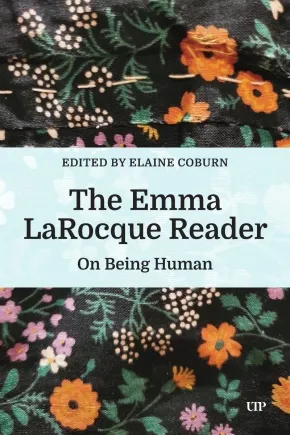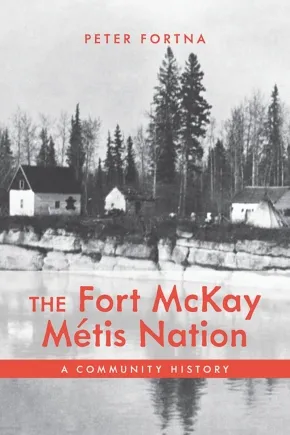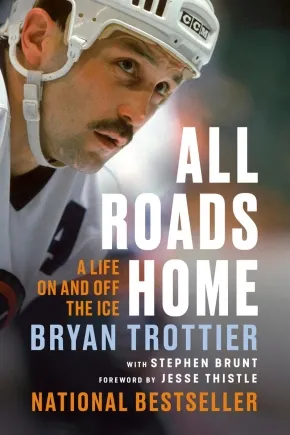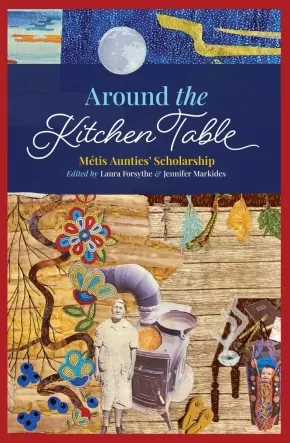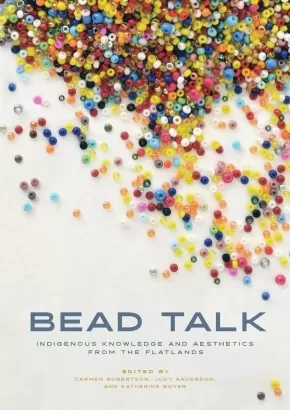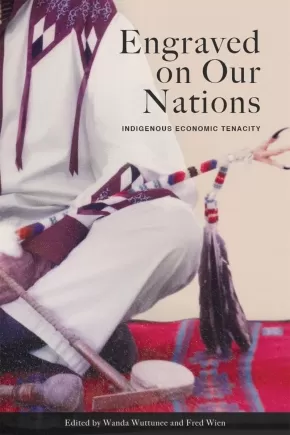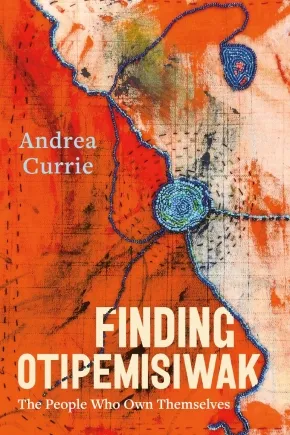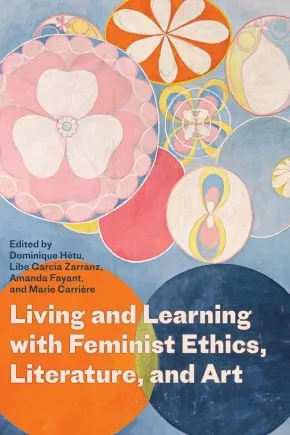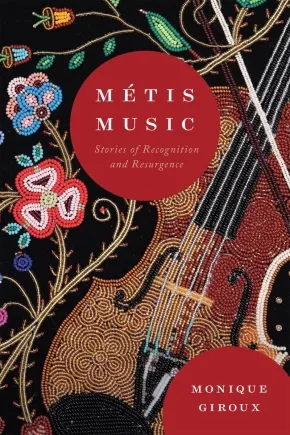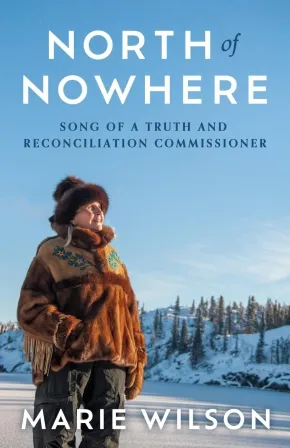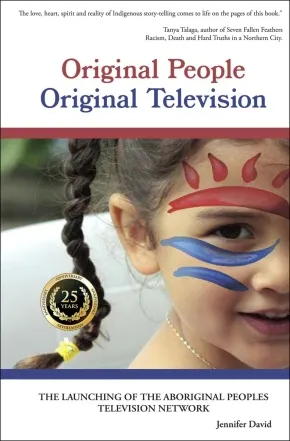
Métis
16
-
30
of
104 Results;
Sort By
Go To
of 7
The Emma LaRocque Reader: On Being Human
$39.95
Editors:
Format:
Paperback
Text Content Territories:
Indigenous Canadian; Métis;
Reading Level: N/A
ISBN / Barcode: 9781487551889
Synopsis:
Synopsis:
Emma LaRocque was born in 1949 in Lac La Biche into a Cree-speaking Métis family. She grew up in a one-room, kerosene-lit log cabin built by her father. At the age of nine, she fought her parents to attend school, where she encountered English and the colonizer’s harmful stereotypes of Indigenous peoples. Confronting the contradictions of colonialism sparked her journey as a writer and scholar, as she sought to understand the dissonance between her identity and the world around her.
The Emma LaRocque Reader is a comprehensive collection of her most significant writings, poetry and prose, offering an intimate window into the mind of one of Canada’s foremost Indigenous scholars. Through her work, LaRocque provides profound insights into the intersections of colonialism, sexism, and racism in Canada, while also critically celebrating the beauty of her community and culture. In the afterword, she reflects on fifty years of challenging the colonial enterprise. A vital contribution to postcolonial literature, The Emma LaRocque Reader intertwines the personal and the political to explore what it means to be human, offering a powerful testament to Indigenous resistance, resilience, and vision.
This collection brings together the works of Métis scholar Emma LaRocque, offering a half-century of her poetry and prose, and shedding new light on Canada, colonialism, and Indigenous resistance.
Educator Information
Chapters
Foreword by Armand Ruffo
Preface by Elaine Coburn
Acknowledgments by Emma LaRocque
Acknowledgments of Permissions to Reprint
Introduction by Elaine Coburn
1975 A Personal Essay on Poverty (Excerpt from Defeathering the Indian)
1983 The Métis in English Canadian Literature
1988 On the Ethics of Publishing Historical Documents
1989 Racism Runs through Canadian Society
1990 Preface: Here Are Our Voices: Who Will Hear?
1990 Geese (poem)
1990 Nostalgia (poem)
1990 “Progress” (poem)
1990 The Red in Winter (poem)
1990 Incongruence (poem)
1990 Loneliness (poem)
1990 Beggar (poem)
1990 Tides, Towns, and Trains
1992 My Hometown, Northern Canada, South Africa (poem)
1993 Violence in Aboriginal Communities
1994 Long Way from Home (poem)
1996 The Colonization of a Native Woman Scholar
1996 When the Other Is Me: Native Writers Confronting Canadian Literature
2001 Native Identity and the Métis: Otehpayimsuak Peoples
2001 From the Land to the Classroom
2004 When the Wild West Is Me
2006 Sweeping (poem)
2006 Sources of Inspiration: The Birth of "For the Love of Words": Aboriginal Writers of Canada
2007 Métis and Feminist
2009 Reflections on Cultural Continuity through Aboriginal Women’s Writings
2010 Native Writers Reconstruct: Pushing Paradigms
2013 For the Love of Place – Not Just Any Place: Selected Métis Writings
2015 “Resist No Longer”: Reflections on Resistance Writing and Teaching
2016 Contemporary Métis Literature: Resistance, Roots, Innovation
2016 Colonialism Lived
2017 Powerlines (poem)
2022 Wehsakehcha, Comics, Shakespeare, and the Dictionary
2023 Afterword
Index
Additional Information
348 pages | 6.00" x 9.00" | Paperback
The Fort McKay Metis Nation: A Community History
$34.99
Format:
Paperback
Text Content Territories:
Indigenous Canadian; Métis;
ISBN / Barcode: 9781773855929
Synopsis:
Synopsis:
This community history chronicles the processes that led to the founding of the Fort McKay Métis Nation in northern Alberta.
This is the definitive history of the Fort McKay Métis Nation. It traces the evolution of the community from the mid-nineteenth to the early twenty-first century, paying special attention to genealogy, land-use, land-tenure, and responses to mass oil sands development.
The Fort McKay Métis Nation carefully considers the community’s unique historical context, drawing on a broad range of sources including archival research, oral histories, grey literature, and community literature. It examines the complex interrelations between the Fort McKay Metis Nation and their neighbors, the Fort McKay First Nation, and their ways they have connected with each other.
Completed in partnership with the community, The Fort McKay Métis Nation provides perspectives which have never before been shared. It is an important, unique history of a community in the heart of the oil sands.
Additional Information
272 pages | 6.00" x 9.00" | Paperback
Winnipeg: and Other Places
$9.95
Format:
Paperback
Reading Level: N/A
ISBN / Barcode: 9781998779604
Synopsis:
Synopsis:
Winnipeg and Other Places / Winnipeg et ailleurs is a back-to-back bilingual collection of short stories which read as sketches or snapshots of the author’s wanderings. Seen through the author’s subjective lenses, no two people have the same recollection of the past or of what just happened. Memory, loss, and longing are shaped by the author’s native Winnipeg and wherever else fate has taken him.
Educator Information
Bilingual: English and French.
Additional Information
75 pages | 3.00" x 5.00" | Paperback
All Roads Home: A Life On and Off the Ice (PB)
$24.00
Format:
Paperback
Text Content Territories:
Indigenous Canadian; First Nations; Anishinaabeg; Ojibway; Cree (Nehiyawak); Métis;
Reading Level: N/A
ISBN / Barcode: 9780771084492
Synopsis:
Synopsis:
A poignant and inspiring memoir of the people and challenges that shaped the life and career of Canada's most decorated Indigenous athlete.
Over the course of his incredible career, Bryan Trottier set a new standard of hockey excellence. A seven-time Stanley Cup champion (four with the New York Islanders, two with the Pittsburgh Penguins, and one as an assistant coach with the Colorado Avalanche), Trottier won countless awards and is a member of the Hockey Hall of Fame and the Canadian Sports Hall of Fame. In 2017, he was named one of the NHL's Top 100 Players of All Time.
Trottier grew up in Val Marie, Saskatchewan, the son of a Cree/Chippewa/Metis father and an Irish-Canadian mother. All Roads Home offers a poignant, funny, wise, and inspiring look at his coming of age, both on and off the ice. It is a unique memoir in which Trottier shares stories about family, friends, teammates, and coaches, the lessons that he has learned from them, and the profound impact they have had in shaping the person he has become.
Some of the incredible characters featured in the book include Trottier's father Buzz; legendary Islanders coach Al Arbour; teammates Clark Gillies and Mike Bossy; and the Penguins' Mario Lemieux, to name but a few. He'll also talk about the high school English teacher and guidance counsellor who helped him develop self-confidence and encouraged him as a writer: Governor General's Award–winning poet, Lorna Crozier.
All Roads Home also includes a Foreword from bestselling author Jesse Thistle (From the Ashes) and two very special Afterwords: one from Trottier's daughter, Lindsy Ruthven, and the other from his life-long friend, beloved hockey great Dave "Tiger" Williams.
Additional Information
304 pages | 5.16" x 7.95" | Paperback
Around the Kitchen Table: Métis Aunties' Scholarship
$27.95
Editors:
Format:
Paperback
Text Content Territories:
Indigenous Canadian; Métis;
Reading Level: N/A
ISBN / Barcode: 9781772840735
Synopsis:
Synopsis:
Honouring the scholarship of Métis matriarchs
While surveying the field of Indigenous studies, Laura Forsythe and Jennifer Markides recognized a critical need for not only a Métis-focused volume, but one focused on the contributions of Métis women. To address this need, they brought together work by new and established scholars, artists, storytellers, and community leaders that reflects the diversity of research created by Métis women as it is lived, considered, conceptualized, and re-imagined.
With writing by Emma LaRocque and other pioneers of Métis studies, Around the Kitchen Table looks beyond the patriarchy to document and celebrate the scholarship of Métis women. Focusing on experiences in post-secondary environments, this collection necessarily traverses a range of methodologies. Spanning disciplines of social work, education, history, health care, urban studies, sociology, archaeology, and governance, contributors bring their own stories to explorations of spirituality, material culture, colonialism, land-based education, sexuality, language, and representation. The result is an expansive, heartfelt, and accessible "community of Métis thought," as articulated by Markides.
Reverent and revelatory, this collection centres the strong aunties and grandmothers who have shaped Métis communities, culture, and identities with teachings shared in classrooms, auditoriums, and around the kitchen table.
Reviews
"Inspiring, healing, and future-facing, this long overdue book gives us valuable new insights into the histories and identities of Métis people." — Kim Anderson
"Around the Kitchen Table is an exciting and thought-provoking contribution to the fields of Métis Studies and Indigenous feminism. Reading this book is like sitting down to visit with a strong cup of tea and your favourite aunties. It will inspire readers to think about matriarchy in new and exciting ways, teaching us what it means to be Métis women, good relatives, and innovative scholars." — Cheryl Troupe
Educator Information
Other contributors: Jennifer Adese, Christi Belcourt, Hannah Bouvier, Rita Bouvier, Vicki Bouvier, Robline Davey, Leah Marie Dorion, Marilyn Dumont, Nicki Ferland, Chantal Fiola, Lucy Fowler, Chelsea Gabel, Janice Cindy Gaudet, Emily Haines, Shalene Jobin, Emma LaRocque, Amanda LaVallee, Lynn Lavallee, Avery Letendre, Kirsten Lindquist, Yvonne Poitras Pratt, Angela Rancourt, Lisa Shepherd, Allyson Stevenson, Kisha Supernant, Caroline Tait, Angie Tucker, Dawn Wambold
Table of Contents
Contributors
Foreword by Caroline Tait
The Work of Métis Women: An Introduction – Jennifer Markides
Part One: Identity
1. Brown Names – Marilyn Dumont
2. We Know Ourselves – Lisa Shepherd
3. Kaa-waakohtoochik: The Ones Who Are Related to Each Other – Vicki Bouvier
4. The Roots Always Remain: Reconnecting to Our Communities in the Twenty-First Century – Angie Tucker
5. For the Love of Place―Not Just Any Place: Selected Metis Writings – Emma Larocque
6. Coming Home through Métis Research – Allyson Stevenson
7. Valuing Métis Identity in the Prairies through a “5 R” Lens: Our Digital Storytelling Journey – Chelsea Gabel and Amanda LaVallee
8. Prenatal/Postpartum Ceremonies and Parenting as Michif Self-Determination – Chantal Fiola
9. Medicine Women – Jennifer Adese
10. Lii Michif – Lisa Shepherd
Part Two: Women in the Academy
11. Metis Women as Contributors to the Academy Despite Colonial Patriarchy – Laura Forsythe
12. Connecting to Our Ancestors Through Archaeology: Stories of Three Métis Women Academics – Kisha Supernant, Dawn Wambold, and Emily Haines
13. Métis Women Educating in the Academy – Yvonne Poitras Pratt and Jennifer Markides
14. Structural and Lateral Violence Toward Metis Women in the Academy – Lynn Lavallee
Part Three: Research Methodology
15. Métis Research and Relationality: Auntie Governance, the Visiting Way, and Kitchen Table Reflections – Kirsten Lindquist, Shalene Jobin, Avery Letendre
16. Lii Taab di Faam Michif/Metis Women’s Kitchen Table: Practicing Our Sovereignty – Cindy Gaudet and Angela Rancourt
17. Wahkotowin: An Approach to Indigenous (Land-Based) Education – Nicki Ferland
18. Kaa-natoonamaan taanshi chi-ishi-natoonikeeyaan: My Search for how to Research Things (in a Queer Métis paradigm) – Lucy Fowler
19. Differentiating Métis Feminism – Robline Davey
20. Celebrating the Wisdom of Our Métis Matriarchs: Sewing Our Wellness All Together—Kood Toot Aansamb – Leah Dorion, Janice Cindy Gaudet, Hannah Bouvier
21. if the land could speak – Rita Bouvier
Bibliography
Art – Christi Belcourt
Additional Information
200 pages | 6.00" x 9.00" | index, bibliography | Paperback
Bead Talk: Indigenous Knowledge and Aesthetics from the Flatlands
$27.95
Format:
Paperback
Text Content Territories:
Indigenous Canadian; First Nations; Métis;
Reading Level: N/A
ISBN / Barcode: 9781772840650
Synopsis:
Synopsis:
Sewing new understandings.
Indigenous beadwork has taken the art world by storm, but it is still sometimes misunderstood as static, anthropological artifact. Today’s prairie artists defy this categorization, demonstrating how beads tell stories and reclaim cultural identity. Whether artists seek out and share techniques through YouTube videos or in-person gatherings, beading fosters traditional methods of teaching and learning and enables intergenerational transmissions of pattern and skill.
In Bead Talk, editors Carmen Robertson, Judy Anderson, and Katherine Boyer gather conversations, interviews, essays, and full-colour reproductions of beadwork from expert and emerging artists, academics, and curators to illustrate the importance of beading in contemporary Indigenous arts. Taken together, the book poses and responds to philosophical questions about beading on the prairies: How do the practices and processes of beading embody reciprocity, respect, and storytelling? How is beading related to Indigenous ways of knowing? How does beading help individuals reconnect with the land? Why do we bead?
Showcasing beaded tumplines, text, masks, regalia, and more, Bead Talk emphasizes that there is no one way to engage with this art. The contributors to this collection invite us all into the beading circle as they reshape how beads are understood and stitch together generations of artists.
Reviews
“An evocative, aesthetically gorgeous book that is rich in knowledge, relationality, and experience. Curated with care, rooted in artistic practice and lived experience, and embodying a polyvocal, collaborative spirit, it immerses the reader in the world of Indigenous beadwork on the prairies. Bead Talk carries teachings about decolonial love, healing and medicine, cultural knowledges, political and theoretical modes of action, gendered experience, and more. I can’t think of any other book like this—it is a gift!” — Aubrey Hanson
Educator Information
Contributors: Ruth Cuthand, Dayna Danger, Sherry Farrell Racette, Marcy Friesen, Felicia Gay, Franchesca [Fran] Hebert-Spence, Audie Murray, Cathy Mattes.
Table of Contents
Foreword – Brenda Macdougall
Who We Are
Introduction – Carmen Robertson, Judy Anderson, and Katherine Boyer
Part I: Conversations
1. Mentoring/Beading – Ruth Cuthand and Marcy Friesen
2. mîkisistahêwin (bead medicine) – Judy Anderson and Audie Murray
3. Parallel Lines Move Along Together: A Beaded Line that Connects Me to You – Katherine Boyer and Dayna Danger
4. The Power of Gathering: Revisiting the Seeds of Ziigimineshin – Franchesca Hebert-Spence and Carmen Robertson
5. Beads, Blood, and Curating Ruth Cuthand’s Art – Felicia Gay and Carmen Robertson
Part II: Essays
6. “Until We Bead Again”: The BU Beading Babe and Embodying Lateral Love and Generous Reciprocity – Cathy Mattes
7. Visiting Kin: Indigenous Flatland Beading Aesthetics – Carmen Robertson
8. If the Needles Don’t Break and the Thread Doesn’t Tangle: Beading Utopia – Sherry Farrell Racette
Afterword: Spreading the Bead Love Far and Wide
Additional Information
240 pages | 6.00" x 8.50" | 62 colour illustrations | Paperback
Curve!: Women Carvers on the Northwest Coast
$45.00
Artists:
Format:
Hardcover
Text Content Territories:
Indigenous Canadian; First Nations;
Reading Level: N/A
ISBN / Barcode: 9781773272542
Synopsis:
Synopsis:
An eighty-year overview of wood and argillite carving by Indigenous women artists on the Northwest Coast.
Though women of the Northwest Coast have long carved poles, canoes, panels, and masks, many of these artists have not become as well known outside their communities as their male counterparts. These artists are cherished within their communities for helping to keep traditional carving practices alive, and for maintaining the dances, songs, and ceremonies that are intertwined with visual art production. This book, and an associated exhibition at the Audain Art Museum, gathers a range of sculptural formats by Indigenous women in order to expand the discourse of carving in the region.
Both the exhibition and publication are co-curated by Dana Claxton, artist, filmmaker and head of the University of British Columbia's Department of Art History, Visual Art and Theory; and Dr. Curtis Collins, the AAM's Director & Chief Curator. Commentaries by Skeena Reece, Claxton, and Marika Swan, and interviews with artists Dale Campbell and Mary Anne Barkhouse are presented alongside more than one hundred artworks from public and private collections across North America, including several newly commissioned pieces.
Featured artists include:
- Ellen Neel (Kwakwaka'wakw, 1916-1966) - Freda Diesing (Haida, 1925-2002) - Doreen Jensen (Gitxsan, 1933-2009) - Susan Point (Musqueam, b. 1952) - Dale Campbell (Tahltan, b. 1954) - Marianne Nicolson (Kwakwaka'wakw, b. 1969) - Arlene Ness (Gitxsan, b. 1970s) - Melanie Russ (Haida, b. 1977) - Marika Swan (Nuu-chah-nulth, b. 1982) - Morgan Asoyuf (Ts'msyen, b. 1984) - Cori Savard (Haida, b. 1985) - Cherish Alexander (Gitwangak, b. 1987) - Stephanie Anderson (Wetsuwet'en, b. 1991) - Veronica Waechter (Gitxsan, b. 1995)
Awards
- Winner of the 2025 Bill Duthie Booksellers' Choice Award
Additional Information
160 pages | 9.20" x 1.10" | 120 colour photos | Hardcover
Engraved on Our Nations: Indigenous Economic Tenacity
$29.95
Format:
Paperback
Text Content Territories:
Indigenous Canadian; First Nations; Métis;
Reading Level: N/A
ISBN / Barcode: 9781772840643
Synopsis:
Synopsis:
A testimony to Indigenous resilience in business.
Despite investments in nation building, self-autonomy, and cultural resurgence, Indigenous economic development has remained an underexplored and underestimated area of research. Engraved on Our Nations overturns the discouraging deficit perspective too common in policy and academia and amplifies the largely undocumented history of successful Indigenous economic activity in Canada.
Following David Newhouse’s overview of Indigenous economic history, the authors of this collection illustrate how First Nation and Métis individuals and communities have met and overcome an array of challenges. Case studies focus on First Nations from Membertou (Nova Scotia) to Tahltan (British Columbia) and Indigenous-led enterprises like McDonald Brothers Electric (Northwest Territories) and Neechi Commons (Manitoba). Simultaneously celebrating Indigenous entrepreneurs and exploring concerns around sustainable development, the book also asks: can capitalism be Indigenized?
This first-of-its-kind collection shares stories not only of entrepreneurial excellence and persistence but savvy leadership, innovation, and reciprocity. In doing so, Engraved on Our Nations provides hope to Indigenous business leaders, youth, and elected officials working on the front lines to improve economic conditions and achieve "a good life" for their communities.
Reviews
“There are few books that can compare to this. The strengths-based approach used by each author is refreshing and will be of service to First Nations communities and to Indigenous and non-Indigenous scholars in community economic development.” — Shelley T. Price
“Engraved on Our Nations clearly articulates the strength, courage, and foresight of Indigenous people. The uplifting stories within this volume will open the eyes of readers and elicit hope, inspiration, and pride.” — Bob Kayseas
Educator Information
Table of Contents
Preface: Exploring Indigenous Economic Tenacity in Canada – Wanda Wuttunee and Fred Wien
Introduction: Indigenous Economic History as the History of Tenacity – David Newhouse
Part One: Strategic Leadership
1. How Does First Nation Social and Economic Development Contribute to the Surrounding Region? A Case Study of Membertou – Mary Beth Doucette and Fred Wien
2. Incremental Planning: The Tsawwassen First Nation Experience – Daniel M. Millette
3. Fulfilling Treaty Promises: Treaty Land Entitlement and Urban Reserves in Saskatchewan – Charlotte Bezamat-Mantes
Part Two: Culturally on Point
4. Trading on Tradition: Innovative Indigenous Enterprise – Isobel M. Findlay
5. Capitalism: Can It Be Indigenized? – Clifford Gordon Atleo
6. Challenges and Opportunities for BC First Nations’ Economic Self-Determination – J. Sayers
Part Three: Family Connections
7. Honouring Entrepreneurial Resilience: Atlantic Region Lifetime Achievers – Chris Googoo, Catherine Martin, and Fred Wien
8. A Métis Light in the Northern Darkness—Case Study – Wanda Wuttunee
9. Neechi Commons Case Study: A Lost Love Letter to Winnipeg – Wanda Wuttunee
Part Four: Partnering for Success
10. Tahltan Economic Tenacity—From Affluence to Poverty to Affluence – Jerry Asp
11. Stronger Together: First Nation Community/Municipality Collaborations – Wanda Wuttunee
Conclusion: What Did We Learn About Indigenous Tenacity? Fred Wien and Wanda Wuttunee
Acknowledgements
Contributors
Index
Additional Information
304 pages | 6.00" x 9.00" | Index, Bibliography | Paperback
Finding Otipemisiwak: The People Who Own Themselves
$24.95
Format:
Paperback
Text Content Territories:
Indigenous Canadian; Métis;
Reading Level: N/A
ISBN / Barcode: 9781551529554
Synopsis:
"Weaving myriad forms - poetry, family history, personal essay, cultural criticism - Andrea Currie tells her story with mercy and force, revealing the warp and weft of the racist system that codified the robbery of Indigenous children through the Sixties Scoop and the devastating consequences for those children, their families, and their communities. In this rigorous and beautiful debut, Currie's unfaltering pursuit of complicated truths lifts into the light the possibility of healing, as she seeks and finds her own lost family, writing her story into theirs. Finding Otipemisiwak is a necessary, searing, and luminous gift of a book." —Rebecca Silver Slayter, author of The Second History
Synopsis:
A Sixties Scoop survivor's journey back to her Nation and the truth of who she is
Otipemisiwak is a Plains Cree word describing the Metis, meaning "the people who own themselves."
Andrea Currie was born into a Metis family with a strong lineage of warriors, land protectors, writers, artists, and musicians - all of which was lost to her when she was adopted as an infant into a white family with no connection to her people. It was 1960, and the Sixties Scoop was in full swing. Together with her younger adopted brother, also Metis, she struggled through her childhood, never feeling like she belonged in that world. When their adoptions fell apart during their teen years, the two siblings found themselves on different paths, yet they stayed connected. Currie takes us through her journey, from the harrowing time of bone-deep disconnection, to the years of searching and self-discovery, into the joys and sorrows of reuniting with her birth family.
Finding Otipemisiwak weaves lyrical prose, poetry, and essays into an incisive commentary on the vulnerability of Indigenous children in a white supremacist child welfare system, the devastation of cultural loss, and the rocky road some people must walk to get to the truth of who they are. Her triumph over the state's attempts to erase her as an Indigenous person is tempered by the often painful complexities of re-entering her cultural community while bearing the mark of the white world in which she was raised. In Finding Otipemisiwak, one woman's stories about surviving, then thriving as a fully present member of her Nation and the human family are a portal. Readers who walk through will better understand the impact of the Sixties Scoop in the country now called Canada.
Reviews
"Finding Otipemisiwak is a stunning, illuminating, and gutting journey through the life of a Sixties Scoop survivor. Page turning, genre bending, personal and political, staggeringly honest, heartbreaking, and glorious, it is a story of resistance, possibility, healing, and hope, of reclamation and reconciliation. With words to stop you in your tracks, Currie braids together heart, soul, and smarts in memoir, poems, threads of her family histories, the Red and Assiniboine Rivers, unflinching questions, and courage, making herself magnificently vulnerable. This book cuts to the heart of the Sixties Scoop crisis, addresses the intergenerational trauma of not only its survivors but its effects on all of us. It gives us all a chance to relearn the history of Canada and to dream of a healing in it. It is part of the truth-telling change this country so desperately needs." — Camille Fouillard, author of Precious Little
"Finding Otipemisiwak is a beautifully written story of tragedy and triumph, as well as one of escape from a false family into the embrace of a loving one. Threading through Currie's remarkable tale is a heart-wrenching bond between her and her adoptive brother, Rob. This book contains a story that desperately needs to be told." —Frank Macdonald, author of A Forest for Calum
"This book takes on the quality of a great radio documentary, splicing prose, poetry, and actuality as Andrea Currie cross-examines colonization and the story that settler society placed over her like a net. When she comes to know who she and her people are, there is joy and there is sadness, but also truth and belonging, a firm scaffolding as Andrea comes to own herself. Finding Otipemisiwak is a powerful act of resistance and gripping to read. It is a balm. —Shelagh Rogers, founding host and co-creator of The Next Chapter CBC Radio
"Finding Otipemisiwak is a poignant story of self-discovery, weaving Red River Metis heritage with personal narrative and ancestral lore and honouring resilience amidst the Sixties Scoop." —Albert G.D. Beck, Director, Manitoba Metis Federation
"Weaving myriad forms - poetry, family history, personal essay, cultural criticism - Andrea Currie tells her story with mercy and force, revealing the warp and weft of the racist system that codified the robbery of Indigenous children through the Sixties Scoop and the devastating consequences for those children, their families, and their communities. In this rigorous and beautiful debut, Currie's unfaltering pursuit of complicated truths lifts into the light the possibility of healing, as she seeks and finds her own lost family, writing her story into theirs. Finding Otipemisiwak is a necessary, searing, and luminous gift of a book." —Rebecca Silver Slayter, author of The Second History
Additional Information
272 pages | 6.00" x 9.00" | Paperback
Indigenous Child and Youth Care: Weaving Two Heart Stories Together (1 in Stock)
$62.95
Format:
Paperback
Grade Levels: University/College;
ISBN / Barcode: 9781773383712
Synopsis:
Synopsis:
At its core, Indigenous Child and Youth Care: Weaving Two Heart Stories Together is about unity. It seeks to create a heart-to-heart practice by bridging Indigenous ways of knowing with Western Child and Youth Care practices, encouraging students to approach their work with a more open understanding of First Nations, Métis, and Inuit worldviews.
Author Cherylanne James guides students through self-location by dismantling their pre-existing biases regarding Indigenous Peoples, understanding personal privilege and power, educating themselves on Canadian and Indigenous history and contexts, and learning about the pervasive impacts of colonialism. Students will cultivate a practice that encourages ethical spaces of engagement while steering away from surface-level or disingenuous interactions.
The text applies concepts and theories such as relational accountability, interconnectivity, resurgence, community-centred approaches, wise practices, relationship-building, anti-oppression, anti-racist, and social justice frameworks to enrich CYC practices and prepare students to engage with Indigenous children, youth, and families in an informed, meaningful way.
Indigenous Child and Youth Care is designed as a journey, wherein the student reflects while they learn and grow as a CYC professional. It includes a variety of pedagogical features that catalyze thoughtful interaction with the material, such as a glossary, discussion questions, reflective practice question boxes, and additional resources for further learning. This is a powerful and vital text for college and university students in Child and Youth Care and Human Services.
Features
- unites Indigenous worldviews, histories and knowledge systems with western Child and Youth Care practices
- exposes students to pre-existing colonial and racist power structures while introducing them to Indigenous concepts and theories for inclusive practice
- contains a broad variety of pedagogical features, including a glossary, reflective practice questions, discussion questions, activities, and additional resources
Educator Information
Table of Contents
Acknowledgements
Introduction
SECTION 1 CONTEXT FOR INDIGENOUS CHILD AND YOUTH PRACTICES
Chapter 1 Self-Location
Chapter 2 Storying Identity
Chapter 3 Living History
Chapter 4 Wise Practice: The Self (Part 1)
Chapter 5 Wise Practice: Working within Spaces and with Others (Part 2)
SECTION 2 CHALLENGES
Chapter 6 Canadian Child Welfare’s Impact on Indigenous Children, Families, and Communities
Chapter 7 MMIWG2S People and Gender-Based Violence
Chapter 8 Trauma
Chapter 9 Legislation, Calls to Action, and Policy
SECTION 3 CHILD, YOUTH, FAMILY, AND COMMUNITY APPROACHES
Chapter 10 Heart-Centred Practice: Fostering Love through Indigenous Approaches to Child and Youth Work
Chapter 11 Supporting Kinship and Family Relations
Chapter 12 Community Wellness: Land, Water, Language, and Community
Chapter 13 Resurgence and Resistance: Re/Centring Indigenous Children and Youth through Strength-Based Approaches
Closing Heart-to-Heart Practice
Child and Youth Care Certification Board
Glossary
Index
Additional Information
308 Pages | 6.75" x 9.75" | Paperback
Living and Learning with Feminist Ethics, Literature, and Art
$39.99
Editors:
Format:
Paperback
Text Content Territories:
Indigenous Canadian;
Reading Level: N/A
ISBN / Barcode: 9781772127713
Synopsis:
Synopsis:
This transdisciplinary collection investigates relations of “living and learning with” as compelling forms of engagement and care between humans, nonhumans, and more-than-humans. Through academic and creative writings, contributors address the need for sustainable relationships between various feminist positions, focussing on Indigenous and Black knowledges, queer and trans artistic interventions, and anti-racist methodologies. They pursue crucial conversations on intersecting oppressions, intersubjectivities, voices, and positionalities. Rooted in feminist literary and artistic practices, the volume explores urgent ongoing transnational issues and will benefit scholars in literature, Indigenous studies, intercultural studies, and gender studies.
Contributors: Kim Anderson, Alexandre Baril, Sissel M. Bergh, Marie Carrière, Élise Couture-Grondin, Junie Désil, Amanda Fayant, Mylène Yannick Gamache, Libe García Zarranz, Dominique Hétu, Larissa Lai, Amina Lalor, Sheri Longboat, Brittany Luby, Stephanie Oliver, Anne Quéma, Veronika Schuchter, Erin Soros, Erin Wunker
Reviews
"This groundbreaking collection redefines feminist poetics, offering timely provocations and sophisticated insights. Engaging with critical university studies, Indigenous studies, trans studies, disability studies, and more, it explores ethical encounters and practices of care and reciprocity not just among humans, but beyond the human as well. The diverse yet thematically cohesive contributions highlight poetry’s role in addressing urgent cultural and political issues." - Sarah Dowling, University of Toronto
"Rarely has such an assortment of talented theorists and literary critics been collected to discuss feminist ethics. With essays arising from vigorous scholarly and artistic practices, the work will engage feminists, literary scholars, poets, activists, and scholars of gender and critical race theory." -Deanna Reder, Simon Fraser University
Additional Information
294 pages | 6.00" x 9.00" | Paperback
Métis Matriarchs: Agents of Transition
$34.95
Editors:
Format:
Paperback
Text Content Territories:
Indigenous Canadian; Métis;
Reading Level: N/A
ISBN / Barcode: 9781779400116
Synopsis:
Synopsis:
Explores the integral roles that Métis women assumed to ensure the survival of their communities during the fur trade era and onward
Métis Matriarchs examines the roles of prominent Métis women from across Western Canada from the late 19th to the mid-20th century, providing a rare glimpse into the everyday lives of these remarkable women who were recognized as Matriarchs and respected for their knowledge, expertise, and authority within their families and communities.
This edited collection provides an opportunity to learn about the significant contributions made by Métis women during a transitional period in Western Canadian history as the fur trade gave way to a more sedentary, industrialized, and agrarian economy. Challenging how we think about Western Canadian settlement processes that removed Indigenous peoples from the land, this collection of stories examines the ways Métis matriarchs responded to colonial and settler colonial interventions into their lives and livelihoods and ultimately ensured the cultural survival of their communities.
Awards
- 2025 Canadian Historical Association Indigenous History Book Prize
Reviews
“A nuanced account of the lives of Métis women and their vital roles as they helped guide their families and communities through generations of transitions.” —Michel Hogue, author of Metis and the Medicine Line
Additional Information
336 pages | 5.00" x 8.00"| Paperback
Métis Music: Stories of Recognition and Resurgence
$38.95
Format:
Paperback
Text Content Territories:
Indigenous Canadian; Métis;
Reading Level: N/A
ISBN / Barcode: 9780228022268
Synopsis:
Synopsis:
Reimagining Métis/settler relations through music
What makes music Métis, and who gets to decide? Complex dynamics of recognition, non-recognition, and erasure have played out over a history of Métis music-making, from the Red River Resistance all the way to the present day.
Monique Giroux argues that Métis music reflects broader social relationships, in particular the politics of recognition. Drawing on newspaper articles, archival documents, interviews with Métis and non-Métis musicians, and over a decade of research at cultural festivals, she charts a history of reframings: a changing but problematic relationship whereby settlers define the boundaries of acceptance to assert control over Métis identity and culture. Complicating this narrative, Giroux points to the many ways Métis have resisted settler recognition and erasure – both within mainstream old-time fiddling and at Métis-run events where people have continued to gather, tell stories, and draw on music to rebuild relationships in a time of resurgence.
Métis Music critically examines music as a shifting site of encounter, showing its readers what to listen for, how to learn by listening, and the importance of acting intentionally with the learning gained through listening.
Reviews
Educator Information
Table of Contents
Figures and Tables ix
Preface: Acknowledging Indigenous Presence, Tracing Ancestral Lines xi
1 Recognition, Resurgence, and Ethical Responsiveness 3
2 Fiddle Dance in the Fur Trade and across the Métis Homeland 34
3 Writing Métis Music in Manitoba Newspapers 60
4 Exchange, Multicultural Compartmentalization, and the New Old-Time Style 86
5 Métis Music at Manitoba’s Old-Time Fiddle Competitions 110
6 Cultural Festivals as Recognition and Resurgence 134
7 On Moving from Louis Riel to Li Keur 169
Postlude: Métis Music 203
Notes 209
References 231
Index 255
Additional Information
288 pages | 6.00" x 9.00" | 9 photos, 3 tables | Paperback
North of Nowhere: Song of a Truth and Reconciliation Commissioner
$34.99
Format:
Hardcover
Text Content Territories:
Indigenous Canadian; First Nations; Inuit; Métis;
ISBN / Barcode: 9781487011482
Synopsis:
Synopsis:
The incomparable first-hand account of the historic Truth and Reconciliation Commission of Canada told by one of the commissioners who led it.
The Truth and Reconciliation Commission was established to record the previously hidden history of more than a century of forced residential schooling for Indigenous children. Marie Wilson helped lead that work as one of just three commissioners. With the skills of a journalist, the heart of a mother and grandmother, and the insights of a life as the spouse of a residential school survivor, Commissioner Wilson guides readers through her years witnessing survivor testimony across the country, providing her unique perspective on the personal toll and enduring public value of the commission. In this unparalleled account, she honours the voices of survivors who have called Canada to attention, determined to heal, reclaim, and thrive.
Part vital public documentary, part probing memoir, North of Nowhere breathes fresh air into the possibilities of reconciliation amid the persistent legacy of residential schools. It is a call to everyone to view the important and continuing work of reconciliation not as an obligation but as a gift.
Reviews
"I found Marie Wilson's North of Nowhere profoundly moving and surprisingly optimistic. With humility and wisdom, she takes us behind the scenes of the Truth and Reconciliation Commission. As a non-Indigenous woman long settled in the North, she has a unique viewpoint, and she leavens an account of the traumatic intergenerational impact of residential schools with details from her own personal story. Wilson goes beyond the grief and misery triggered by the Truth aspect of the TRC to suggest the joy and laughter that true Reconciliation can produce in survivors. But reconciliation will be achieved only if we don't look away. North of Nowhere is a powerful book that shifted my perspective, and, thanks to Wilson's lucid prose, helps the rest of us glimpse what is needed." — Charlotte Gray (CM), author of Passionate Mothers, Powerful Sons: The Lives of Jennie Jerome Churchill and Sara Delano Roosevelt
"For anyone wanting a front row seat to the Spirit, the vision, and the mechanics of the Truth and Reconciliation Commission of Canada, North of Nowhere is definitely it. Commissioner Dr. Marie Wilson recounts and celebrates the courage of everyone involved in one of Canada's most important chapters of coming to terms with residential school Survivors and their families and their communities forever changed with a policy of cultural genocide. I hope everyone reads this and finds their way to support Survivors, their families, and their communities as they continue to reclaim so much of what was stolen. What a profound and riveting read." — Richard Van Camp, author of The Lesser Blessed and Godless but Loyal to Heaven
"The long-matured work of a true elder, this magnificent book is a sober masterpiece of sacred activism. It deserves to be read by everyone aghast at the chaos and cruelty of our world. Its level decency of tone, its lucidity, its determined hope in terrible circumstances both transmit and model those qualities we all now need to build a new world out of the smouldering ashes of the old." — Andrew Harvey, author of The Hope: A Guide to Sacred Activism
"In North of Nowhere, Marie Wilson honours her vow to residential school Survivors to 'do no harm' and to bear witness to and honour their experiences. Marie has achieved her purpose to educate readers and inspire reconciliation and, most importantly, hope. 'I see you. I hear you. I believe you. And I love you'-Marie's words as a Commissioner to Survivors set the tone for this very important book." — Perry Bellegarde, former National Chief of the Assembly of First Nations
"This book is one of the best I've ever read. It made me laugh, get emotional, and helped reset my journey on the role I need to play. As a child of residential school Survivors, I was motivated to continue to learn my language and strengthen my pride as an Indigenous person. Truth must come before reconciliation; this book will empower Canadians to focus on what we can control today when it comes to implementing the Calls to Action. This book advocates for building awareness, understanding, and long-term relationships between Indigenous people and Canadians. If every Canadian reads this book, the Truth and Reconciliation Calls to Action can be achieved." — Cadmus Delorme, former chief of Cowessess First Nation
"Journalist Marie Wilson brings us into the emotion-charged rooms, the sacred spaces of Canada's Truth and Reconciliation hearings. She listens with the heart of a mother, looking into the souls of the adult Survivors standing before her and seeing the children they once were. Though she holds nothing back, in the end this is a triumphant, restorative narrative-a testament to the healing that happens when we share our deepest, darkest truths." — Judy Rodgers, founding director of Images & Voice of Hope, board member of The Peace Studio
"North of Nowhere is the story of a national soul-searching, braided with Dr. Marie Wilson's own personal story and her unique perspective as a Truth and Reconciliation Commissioner. Every page tells a story. This is a book that is bound to ignite dialogue. It has been a catalyst that has been the spark for numerous visits, deep discussions, and reflections, which is why we wanted to write a collective review. Marie's writing had us thinking and talking about the stories, truths, and wisdom shared throughout the pages. Through her writing, Marie elicits emotional and insightful responses that move us along our own journeys of understanding the truth of Canada." — Shelagh Rogers and Monique Gray Smith
"Marie Wilson is the truth keeper entrusted with the accounts of the First Nations, Métis, and Inuit children who went to residential schools, the memories of those who did not make it home and the fate of us all if we do not learn from the past. The savagery of 'civilization' comes into stark relief as children emerge from the pages to awaken the national consciousness and render the TRC Calls to Action imperative." — Cindy Blackstock, executive director, First Nations Child & Family Caring Society
"Beautifully written, Marie Wilson's North of Nowhere is a stunning work of truth, power, and wisdom. An imperative read for all Canadians to understand the layers of shrapnel left by the residential school system that will leave you with emotion and hope. Wilson is an incredibly brilliant and gifted writer." — Angela Sterritt, author of Unbroken: My Fight for Survival, Hope, and Justice for Indigenous Women and Girls
Educator Information
Curriculum Connections: Social Science, Ethnic Studies, Canadian Studies, Indigenous STudies
Additional Information
384 pages | 6.00" x 9.00" | Hardcover
Original People, Original Television: The Launching of the Aboriginal Peoples Television Network (Special Edition)
$28.95
Format:
Paperback
Text Content Territories:
Indigenous Canadian; First Nations; Inuit; Métis;
Reading Level: N/A
ISBN / Barcode: 9781926886626
Synopsis:
Synopsis:
Original People, Original Television is the behind-the-scenes account of a little known revolution in Canadian broadcasting—a journey begun in 1922 with Nanook of the North, wending its way across generations and the width and breadth of the traditional territories of the Inuit, First Nations and Métis; culminating in the 1999 launch of the world’s inaugural Indigenous led broadcast, the Aboriginal Peoples’ Television Network.
Additional Information
282 pages | 9.00" x 6.00" | b&w photos, index, bibliography | Special Edition | Paperback
Sort By
Go To
of 7

